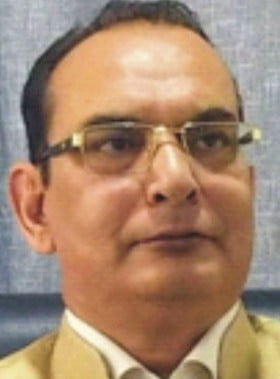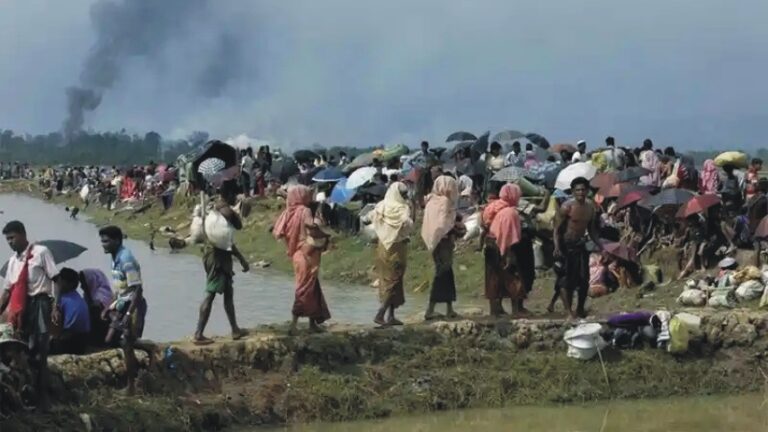

The UN High Commissioner for Human Rights has reported receiving frightening and disturbing reports from northern Rakhine state in Myanmar of the impact of the conflict on civilian lives and property.
In a briefing to journalists in Geneva on Friday, May 24th, Liz Throssell, spokesperson for the UN High Commissioner for Human Rights, said that “Some of the most serious allegations concern incidents of killing of Rohingya civilians and the burning of their property, has been received by the UN,” noting that tens of thousands of civilians have been displaced in recent days by fighting in Buthidaung and Maungdaw townships.
She said that the information gathered in testimony from victims, eyewitnesses, satellite images, and online video and pictures over the last week indicate, “Buthidaung town has been largely burned.”
 “We have received information indicating that the burning started on May 17, two days after the military had retreated from the town and the Arakan Army claimed to have taken full control,” she said.
“We have received information indicating that the burning started on May 17, two days after the military had retreated from the town and the Arakan Army claimed to have taken full control,” she said.
Speaking in Bangkok, James Rodehaver, head of Myanmar Team, Office of the High Commissioner for Human Rights, said his team had spoken to many sources on the ground and reviewed numerous materials, many of which “was deemed to be credible.”
“Our offices are corroborating information further, particularly in establishing who were the perpetrators of the burning. One survivor described seeing dozens of dead bodies as he fled the town. Another survivor said that he was among a group of displaced persons numbering in the tens of thousands, who attempted to move outside of the town to safety but were blocked by the Arakan Army,” Rodehaver said, pointing out that the Arakan Army had abused survivors and extorted money from them as they fled the town.
Earlier History
The latest fighting comes in the context of a civil war in Myanmar that began after the army ousted the elected government of Aung San Suu Kyi, leading to an armed resistance opposing military rule.

The pro-democracy fighters are allied with several of the ethnic minority groups that have been fighting for greater autonomy for decades, and have well-trained military forces.
The Arakan Army is an armed ethnic group fighting as part of an alliance against the Myanmar military. The AA says it is fighting for more autonomy for the ethnic Rakhine population in the state, which is also home to an estimated 600,000 members of the persecuted Rohingya Muslim minority, who have chosen to remain in the country.
The Arakan Army had a loose cease-fire with the military government until last October, when it joined with two other ethnic armed groups to capture territory in northeastern Myanmar.
 The Rohingya were the targets of a brutal counterinsurgency campaign incorporating rape and murder that saw an estimated 740,000 flee to neighboring Bangladesh as their villages were burned down by government troops in 2017.
The Rohingya were the targets of a brutal counterinsurgency campaign incorporating rape and murder that saw an estimated 740,000 flee to neighboring Bangladesh as their villages were burned down by government troops in 2017.
Rohingya have lived in Myanmar for generations, but they are widely regarded by many in the country’s Buddhist majority, including members of the Rakhine minority, as having illegally migrated from Bangladesh.
The Rohingya face a great amount of prejudice and are generally denied citizenship and other basic rights.
Latest Incidents
In the weeks leading up to the burning of Buthidaung, the Myanmar team of the UN human rights offices have documented renewed attacks on Rohingya civilians by both the Arakan Army and by the military in northern Rakhine state, including many by aerial strikes and drones.
Rodehaver said his office also has received reports of shooting at unarmed fleeing villagers, multiple disappearances and burnings of homes, and has confirmed four cases of beheadings.

He said the military has been actively targeting the Rohingya for years and has “actively enforced draconian and discriminatory restrictions affecting all aspects of their lives.”
“It is one of the reasons why the Rohingya, whenever they were asked to leave Buthidaung and other villages, have been very reluctant to move because they have needed special permission to move outside of their township of residence. They also have nowhere else to go.
“They, of course, have learned very hard lessons in 2017, knowing that whenever movement starts, it usually ends with them leaving their homes, never to see them again,” he said.
The Myanmar junta, which has been at war with its people for decades, recently has suffered many defeats. One consequence is young men have been conscripted from the Rohingya to fight its battles, by promising them many benefits, such as more food rations for their families and a promise of citizenship. Rodehaver calls that an insidious ploy by military leaders.
Tom Andrews, the UN special rapporteur on the human rights situation in Myanmar, warned Thursday of “ominous signs of another Rohingya bloodbath in Rakhine state” if the international community were to continue to turn a blind eye and fail to take action to save the lives of thousands of Rohingya.
“Once again, the world seems to be failing a desperate people in their hour of peril, while a hate-driven unnatural disaster unfolds in real-time in Myanmar’s Rakhine state,” he said.

Mirroring that assessment, UN human rights chief Volker Türk is calling for “an immediate end to the violence, and for all civilians to be protected without any distinction based on identity. “Prompt and unhindered humanitarian relief must be allowed to flow, and all parties must comply fully and unconditionally with international law,” he said.
More than a million Rohingya have taken shelter in neighboring Bangladesh after fleeing Rakhine, including hundreds of thousands in 2017 during an earlier crackdown by the military that is now the subject of a United Nations genocide court case.
What perplexes one here is the ominous silence of the so-called Muslim states against the Myanmar’s junta, for targeting the Rohingyas. Even the Muslim organizations like the OIC have not moved beyond passing resolutions against the massacre of Rohingyas, and have refrained from taking any firm action at the ground level to force the junta to put a stop to these inhuman massacres. The same applies to the plight of Uyghur Muslims in China. ![]()
__________
Also Read:
Dr. Manmohan Singh: A Hero Shy of His Own Greatness
‘Yahi Hai Mera Mama’ – A commentary on Lok Sabha Elections
AAP under scrutiny; Delving into poetic justice
Hai, Modi kitna bura hai! (Agreed. But…)
Relax, My dead body won’t trouble your shoulders!
Shilanyas was a mistake, but Rajiv was not aware of unlocking Babri

Disclaimer : PunjabTodayTV.com and other platforms of the Punjab Today group strive to include views and opinions from across the entire spectrum, but by no means do we agree with everything we publish. Our efforts and editorial choices consistently underscore our authors’ right to the freedom of speech. However, it should be clear to all readers that individual authors are responsible for the information, ideas or opinions in their articles, and very often, these do not reflect the views of PunjabTodayTV.com or other platforms of the group. Punjab Today does not assume any responsibility or liability for the views of authors whose work appears here.
Punjab Today believes in serious, engaging, narrative journalism at a time when mainstream media houses seem to have given up on long-form writing and news television has blurred or altogether erased the lines between news and slapstick entertainment. We at Punjab Today believe that readers such as yourself appreciate cerebral journalism, and would like you to hold us against the best international industry standards. Brickbats are welcome even more than bouquets, though an occasional pat on the back is always encouraging. Good journalism can be a lifeline in these uncertain times worldwide. You can support us in myriad ways. To begin with, by spreading word about us and forwarding this reportage. Stay engaged.
— Team PT


Copyright © Punjab Today TV : All right Reserve 2016 - 2025 |